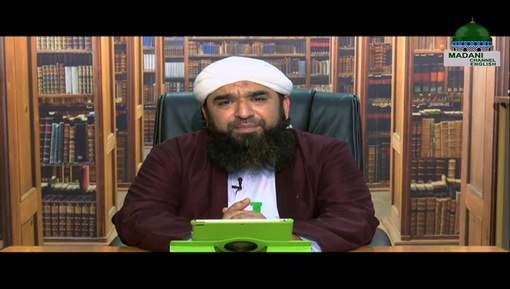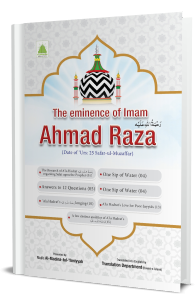
Pious Men
Autobiography of Imam Ahmad Raza Khan
Mawlana Hafiz Hafeez ul-Rahman Attari Madani
Imam Ahmad Raza Khan رَحْمَةُ الـلّٰـهِ عَلَيْه passed away on 25th Safar, 1340 AH. Muslims mark his death anniversary every year on this date. As a humble contribution towards celebrating his achievements, we are sharing key details and milestones of his life in light of his writings. Where possible, we have used the Imam’s first-hand accounts.
Birth: I was born on Saturday afternoon, 10th Shawwal, 1272 AH, corresponding to 14th June 1856.[1]
Name: Muhammad, but his grandfather referred to him as Ahmad Raza—the name by which he is commonly known.[2]
Education: With my first teacher, I would review the textbooks once or twice only. Then, in class, I would recall everything I had read, word for word, letter for letter. This amazed my teacher. He once rhetorically asked, “Are you a human or jinn? It takes me longer to teach the lesson than for you to memorize it!” The Imam replied, “Thanks to Allah, I am human. But yes, His grace and blessings are with me.”[3]
Imam Ahmad Raza رَحْمَةُ الـلّٰـهِ عَلَيْه also explained:
Some people would unknowingly write hafiz (memorizer of the Quran) before my name, although I was not qualified for this accolade…˹However, now,˺ I have worked hard and memorised the Quran. I have done this so the servants of Allah who add hafiz to my name are not ˹liable for˺ erring.[4]
Graduation and issuing legal edicts: When I graduated and my name was officially added to the list of scholars, I was granted the honour of issuing religious edicts (fatāwa) on 14th of Shaban, 1286 AH. That very date, salah become obligatory on me. I was 13 years, 10 months, and 4 days old. I have been serving Islam in this manner ever since.[5]
Training Period: (In regard to issuing verdicts and denouncing deviants, he says:)
Like medicine, theoretical study alone does not qualify a person in these fields. Rather, one has to train at the hands of a skilled practitioner. For seven years, I was trained by a professional (his father, Mufti Naqi Ali Khan). I remember the time, day, place, topics of discussion, and where he arrived from very well.[6]
Spiritual pledge: I fell asleep one afternoon and saw my grandfather رَضِىَ الـلّٰـهُ عَـنْهُ ˹in a dream˺. He gifted me a small box and said, “Soon, someone will come to remove the worries and pains of your heart.” Two or three days later, Mawlānā ʿAbd al-Qādir رَحْمَةُ الـلّٰـهِ عَلَيْه arrived from Badayun and took me to Marehra. There, I was honoured by taking the spiritual pledge at the hands of Shah Āl-i-Rasūl Marehrawi.[7]
First Hajj: I performed my first Hajj with my noble parents رَحْمَةُ الـلّٰـهِ عَلَيْهمَا when I was 23 years old.[8]
Second and Final Hajj: When I was blessed with visiting Madina the second time, I was 51 years and 5 months old.[9]
Leading Prayer in Makka: During this ˹second˺ visit to Madina, the esteemed and noble Hanafi scholars, such as the Hanafi Mufti Shaykh Ṣāliḥ Kamāl and Sayyid Ismāʿīl al-Ḥanafī, would lead the prayer. They forwarded this lowly man (referring to himself) to lead them in prayer.[10]
His mother’s love: When I was leaving ˹for the second Hajj˺, I performed wudu from water in a vessel. My mother did not allow anyone to throw that water away until I returned, as it was the water which I had used.[11]
Hatred towards the enemies of Allah: I have possessed hatred towards the enemies of Allah since childhood. By Allah’s grace, my children are the same.[12]
The standard to love family or wealth by: I have never loved wealth for its own sake. I have only loved wealth for the purpose of spending in the way of Allah. Likewise, I do not love my family for their own sake, but because fostering loving ties of kinship is a good deed. This is not a matter of personal choice, but my disposition.[13]
Love for Allah and His beloved: If my heart was split in half, I swear by Allah one half would have “There is no God but Allah” written on it, and the other half would read, “Muhammad is Allah’s messenger.”[14]
Foreknowledge of his death: 4 months and 22 days before his death, Imam Ahmad Raza Khan رَحْمَةُ الـلّٰـهِ عَلَيْه extracted information regarding the time of his death from the 15th verse of Surat al-Dahr. According to Islamic numerology, this verse has the value of 1340, and this is the Islamic year in which he passed away. This is the verse previously discussed:
وَ یُطَافُ عَلَیۡہِمۡ بِاٰنِیَۃٍ مِّنۡ فِضَّۃٍ وَّ اَکۡوَابٍ [15]
Death: He passed away on Friday, 25th of Safar, 1340 AH, corresponding to 28th October, 1921 CE. It was 2:38 pm in India (2:08 pm in Pakistan). Right as the azan for Friday prayers was called, Imam Ahmad Raza Khan رَحْمَةُ الـلّٰـهِ عَلَيْه breathed his last. His shrine in Bareilly, India, remains a locus of blessings and is visited by people throughout the year.[16]
[1] Malfuzaat-e-Ala Hazrat, p. 63
[2] Tazkirah Imam Ahmad Raza, p. 2
[3] Hayat-e-Ala Hazrat, vol. 1, p. 68, Tazkirah Imam Ahmad Raza, p. 5
[4] Hayat-e-Ala Hazrat, vol. 1, p. 208
[5] Tazkirah Jameel, p. 101, Hayat-e-Ala Hazrat, vol. 1, pp. 279 - 280
[6] Malfuzaat-e-Ala Hazrat, p. 141
[7] Malfuzaat-e-Ala Hazrat, p. 412
[8] Malfuzaat-e-Ala Hazrat, p. 181
[9] Malfuzaat-e-Ala Hazrat, p. 205
[10] Malfuzaat-e-Ala Hazrat, p. 84, Hayat-e-Ala Hazrat, vol. 1, p. 399
[11] Malfuzaat-e-Ala Hazrat, p. 183
[12] Malfuzaat-e-Ala Hazrat, p. 410
[13] Malfuzaat-e-Ala Hazrat, p. 497
[14] Malfuzaat-e-Ala Hazrat, p. 411
[15] Sawanih Imam Ahmad Raza, p. 384, Wasaya Shareef, p. 25
[16] Tazkirah Imam Ahmad Raza, p. 18
















Comments